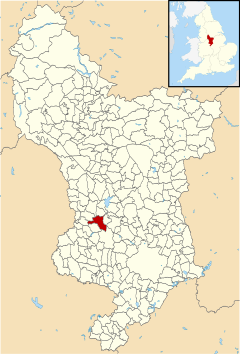Bradley, Derbyshire
| Bradley | |
|---|---|
 Church of All Saints, Bradley. | |
 Bradley parish highlighted within Derbyshire | |
| Population | 313 (2011) |
| OS grid reference | SK225457 |
| District | |
| Shire county | |
| Region | |
| Country | England |
| Sovereign state | United Kingdom |
| Post town | ASHBOURNE |
| Postcode district | DE6 |
| Police | Derbyshire |
| Fire | Derbyshire |
| Ambulance | East Midlands |
Bradley is a village and civil parish in Derbyshire just east of Ashbourne. The population of the civil parish taken at the 2011 Census was 313.[1] Other neighbouring parishes include Hulland and Yeldersley.
History
Bradley was mentioned in the Domesday book of 1086 as belonging to Henry de Ferrers,[2] having previously been in the possession of "Aelfric of Bradbourne" and "Leofwin".[3][4] The village is assessed as being worth twenty shillings (a fall, having been valued as worth £2 in 1066), and having a taxable value of 1 geld unit.[3][4] The village is recorded as having 17 households, 6 of which were smallholdings.[3]
In 1891 Kelly described the village as "an agricultural parish and picturesque but scattered village" of 2,374 acres.[5] The soil is described as "chiefly gravel and clay", with the main crops grown being hay, wheat, barley, oats and turnips.[5] The population is recorded as 227 and the rateable value of the village given as £2,945.[5]
Village landmarks
All Saints' Church
The village's parish church is dedicated to All Saints.[6] Primarily constructed in the late 14th century, but incorporating some earlier work, it has an unusual layout with an aisleless nave and chancel, and no tower.[6][7] In 1891 the church was described as "an edifice in the Decorated style of the early 14th century, consists of a small chancel and nave under a single roof, south porch and a wooden turret at the west end containing 3 bells, two of which date from 1722, the tenor being undated".[5]
The 18th century wooden bell-turret has been removed and one of the bells is attached to the rear wall. The church was substantially renovated in the 19th century.[7] The church contains several graves and monuments belonging to members of the Kniveton, Byrom and Meynell families, who had formerly resided at Bradley Hall opposite the church.[5][6]

Bradley Hall
The original Bradley Hall was sold by Sir Andrew Kniverton who was bankrupted by the English Civil War.[6] The Old Bradley Hall was demolished by Hugo Meynell in the late 18th century, who built the Hall we currently see.[6] What is known as "Bradley Hall" today was originally built to be part of a stable-block for a new Hall which was never built.[8][9] The stable block was later converted to serve as the residence.[8][9] Additions were made to the Hall in both the 19th and 20th centuries; it is currently protected as Grade II Listed.[8] The hall was recently listed up for sale with a guide price of £2,900,000.[10]
Hole-in-the-Wall
Hole-in-the-Wall is a pair of brick tenements dated 1750–51, with a central road arch, on the outskirts of the main village. It was formally the entrance gate to the park.[6][11]
Primary school
The Church of England primary school was founded in 1873.[6]
Notable residents
- Thomas Bancroft, a 17th-century poet from Swarkestone, retired here.
The following lines are by Sir Aston Cockayne and begin a commendation of Bancroft's poem:
From your retir'd abode in Bradley town,
Welcome, my friend, abroad to fair renown.
Nova Atlantis and Eutopia you
Again expose unto the publique view[12]
- Major Ernest Clowes, DSO, who served in the second Anglo-Boer War with the Life Guards, and in the Great War.[13] Succeeded by his son John Ernest Clowes who served with the Special Operations Executive (SOE) during World War Two in Greece (Force 133) and Burma (Force 136).[14]
See also
References
- ^ "Civil Parish population 2011". Neighbourhood Statistics. Office for National Statistics. Retrieved 20 March 2016.
- ^ Henry was given a large number of manors in Derbyshire including Shirley, Aston-on-Trent and Pilsbury.
- ^ a b c "Bradley". Domesday Map. Archived from the original on 28 June 2012. Retrieved 5 May 2013.
- ^ a b Domesday Book: A Complete Translation. London: Penguin, 2003. ISBN 0-14-143994-7 p.747
- ^ a b c d e Kelly (1891). Kelly's Directory of the Counties of Derby, Notts, Leicester and Rutland. pp. 54–5.
- ^ a b c d e f g "Bradley near Ashbourne". Derbyshire UK. Retrieved 5 May 2013.
- ^ a b "All Saints Church, Bradley". British Listed Buildings. Retrieved 5 May 2013.
- ^ a b c "Bradley Hall". British Listed Buildings. Retrieved 5 May 2013.
- ^ a b "Bradley Hall Sales Brochure". Retrieved 5 May 2013.[permanent dead link]
- ^ "Bradley Hall Sales Catalogue". Archived from the original on 19 June 2013. Retrieved 5 May 2013.
- ^ Pevsner, Nikolaus. 1986. The Buildings of England: Derbyshire. pp 104–105. Harmondsworth, Middx. Penguin.
- ^ The Heroical Lover[permanent dead link] accessed 25 November 2007
- ^ "Major Ernest William Clowes". ThePeerage.com. Darryl Lundy. Retrieved 22 August 2019.
- ^ Duckett, Richard. "The men of SOE Burma". SOE in Burma. Retrieved 22 August 2019.
